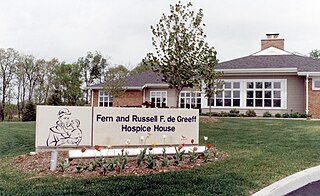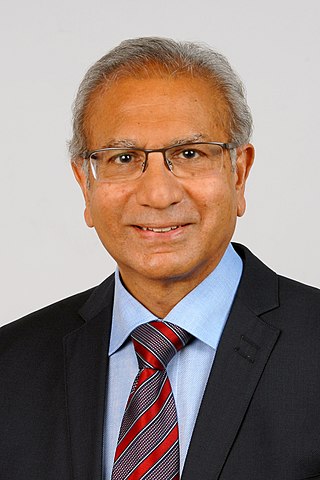Related Research Articles
Palliative care is an interdisciplinary medical caregiving approach aimed at optimizing quality of life and mitigating suffering among people with serious, complex, and often terminal illnesses. Within the published literature, many definitions of palliative care exist. The World Health Organization (WHO) describes palliative care as
"an approach that improves the quality of life of patients and their families facing the problem associated with life-threatening illness, through the prevention and relief of suffering by means of early identification and impeccable assessment and treatment of pain and other problems, physical, psychosocial, and spiritual".

Dame Cicely Mary Strode Saunders was an English nurse, social worker, physician and writer. She is noted for her work in terminal care research and her role in the birth of the hospice movement, emphasising the importance of palliative care in modern medicine, and opposing the legalisation of voluntary euthanasia.

The UCD School of Medicine at University College Dublin, Ireland, was founded in 1854. At undergraduate level, the school offers programmes in Medicine MB BCh BAO, BSc Biomedical Health and Life Sciences, and the BSc Radiography. At graduate level, the school UCD offers over 40 programmes for health care professionals.

Ira Robert Byock is an American physician, author, and advocate for palliative care. He is founder and chief medical officer of the Providence St. Joseph Health Institute for Human Caring in Torrance, California, and holds appointments as active emeritus professor of medicine and professor of community health and family medicine at the Geisel School of Medicine at Dartmouth College. He was director of palliative medicine at Dartmouth–Hitchcock Medical Center, from 2003–14, and associate director for patient and family-centered care at the affiliated Norris-Cotton Cancer Center.
Hugh Redmond Brady is an Irish academic, the 17th President of Imperial College London, and a professor of medicine. He was the 13th President and Vice-Chancellor of the University of Bristol. He is also President Emeritus of University College, Dublin (UCD), having served as UCD's eighth President from 2004 to 2013.
The INCTR Challenge Fund is the UK charity (Charity No. 1079181) raising funds for projects co-ordinated by the International Network for Cancer Treatment Research (INCTR) that improve the care delivered to cancer patients in developing countries and help reduce their suffering.

Hospice care is a type of health care that focuses on the palliation of a terminally ill patient's pain and symptoms and attending to their emotional and spiritual needs at the end of life. Hospice care prioritizes comfort and quality of life by reducing pain and suffering. Hospice care provides an alternative to therapies focused on life-prolonging measures that may be arduous, likely to cause more symptoms, or are not aligned with a person's goals.
Robert Geoffrey Twycross was a British physician and writer. He was a pioneer of the hospice movement during the 1970s, when he helped palliative care gain recognition as an accepted field of modern medicine.
In 2006, hospice and palliative medicine was officially recognized by the American Board of Medical Specialties, and is co-sponsored by the American Boards of
African Palliative Care Association (APCA) is a pan-African non-governmental organization (NGO) working to promote and support the integration of palliative care into health systems across Africa. APCA has appeared on the BBC World Service, The Guardian and across regional and national African press advocating for better palliative care provision.

M. R. Rajagopal is an Indian palliative care physician (anesthesiologist) and professor referred to as the 'father of palliative care in India' in honour of his significant contribution to the palliative care scene in India.
Lucy Finch is a palliative nurse who has worked in several African countries and founded a hospice in Malawi – Ndi Moyo – "the place giving life".
Gillian Rachel Ford is a British retired medical administrator.

Professor Emeritus Sam H Ahmedzai FRCP, FRCPGlas, FFPMRCoA is a British supportive and palliative care specialist and an Honorary Consultant Physician in Palliative Medicine.

Sr. Dr. Maura Lynch was an Irish doctor, a nun, and proponent of women's health.
The Worldwide Hospice Palliative Care Alliance or WHPCA is an international non-governmental organization based in the United Kingdom. In official relations with the World Health Organization (WHO), the WHPCA works in conjunction with over 200 regional institutions and national partners for the global development of palliative care and advancement of pain relief. It advocates for changes in public policy on accessibility of pain relief in end-of-life care and integration of palliative care into national health agendas. In 2014 it released the Global Atlas of Palliative Care at the End of Life in a joint publication with the WHO.
William Gerard Anthony Holohan is an Irish public health physician who served as Chief Medical Officer of Ireland from May 2008 to 1 July 2022. Fergal Bowers described him as being "as familiar as Dr Anthony Fauci in the US and arguably as influential".
Mhoira E.H. LengFRSE MBChB MRCP(UK) FRCP(Ed and Glas) is one of the first Scottish specialists in palliative care, who has developed the palliative care services internationally, working in Eastern Europe, India and Africa and advises international institutions and agencies on palliative care in the developing world. In 2021, Leng was admitted as one of the new female Fellows of the Royal Society of Edinburgh.

Abhishek Shukla is an Indian geriatrician and palliative care physician. He is the expert on Hospice and palliative medicine.
Mari Lloyd-Williams is a Welsh medical consultant who specialises in palliative care. She taught at the University of Liverpool for more than two decades before moving to Liverpool John Moores University in 2022.
References
- ↑ "A world of pain". CBS News. Retrieved 5 September 2013.
- ↑ "Health | Help for Uganda's terminally ill". BBC News. 26 October 2002. Retrieved 5 September 2013.
- ↑ "UK | England | Lancashire | University honour for health work". BBC News. 21 July 2009. Retrieved 5 September 2013.
- 1 2 "WHO | Project description". Who.int. 4 December 2000. Archived from the original on 20 August 2003. Retrieved 5 September 2013.
- 1 2 "Anne Merriman | Profiles | Edge Hill University". Edgehill.ac.uk. Archived from the original on 13 July 2013. Retrieved 5 September 2013.
- ↑ "WHO | Uganda Team". Who.int. 28 January 2012. Archived from the original on 13 July 2013. Retrieved 5 September 2013.
- ↑ "Award-winning short documentary 'Okuyamba' to screen at Hesburgh Center // News // Notre Dame News // University of Notre Dame". News.nd.edu. 19 March 2012. Retrieved 5 September 2013.
- 1 2 "'I feel as though I have been used by God for His work and I'm so happy about that'". Independent.ie. 24 March 2009. Retrieved 5 September 2013.
- ↑ "Hospice Africa - Dr Anne Merriman". YouTube. 23 July 2009. Retrieved 5 September 2013.
- ↑ "A 'model hospice' in Africa – Irish Medical Times". Imt.ie. 28 February 2013. Retrieved 5 September 2013.
- 1 2 "Hospice Africa Ireland: News & Events - Dr. Anne Merriman Biography". Hospiceafrica.ie. Archived from the original on 23 September 2010. Retrieved 5 September 2013.
- ↑ "Usaid/Uganda | Hospice Africa Uganda". Uganda.usaid.gov. 1 January 2005. Archived from the original on 13 July 2013. Retrieved 5 September 2013.
- ↑ "African Palliative Care Association : Palliative Care : A Handbook" (PDF). Apps.who.int. Archived from the original (PDF) on 5 March 2016. Retrieved 5 September 2013.
- 1 2 "50th St Andrew's Day Festival Symposium : Five decades of medical progress" (PDF). Rcpe.ac.uk. Retrieved 5 September 2013.
- ↑ "Dr Catherine D'Souza - INCTR News". Inctr-news.wikidot.com. 7 March 2012. Retrieved 5 September 2013.
- ↑ "UCD Medicine Courses - myUCD - University College Dublin - Ireland". myUCD. Retrieved 5 September 2013.
- ↑ "Singapore's advocate of palliative care : healthcare asia – medical and healthcare news in asia". 16 July 2012. Retrieved 5 September 2013.
- ↑ "Biography | Dr. Anne Merriman". Annemerriman.com. 23 July 2012. Archived from the original on 15 March 2014. Retrieved 5 September 2013.
- ↑ ""Audactiy to Love" by Dr Anne Merriman | Hospice Africa". Hospiceafrica.ie. 6 November 2007. Archived from the original on 31 December 2013. Retrieved 5 September 2013.
- ↑ Philip Bunker (24 July 2013). "Honorary Fellows of LJMU". Ljmu.ac.uk. Archived from the original on 23 January 2013. Retrieved 5 September 2013.
- ↑ "In Depth | New Year Honours | Diplomatic Service and overseas". BBC News. 31 December 2001. Retrieved 5 September 2013.
- ↑ "UCD Alumni Awards". UCD School of Medicine. Retrieved 29 August 2022.
- ↑ "IOELC Honorary Members". Lancs.ac.uk. Retrieved 5 September 2013.
- ↑ "12. An Interview with Professor Anne Merriman". UCDsmj. Retrieved 29 August 2022.